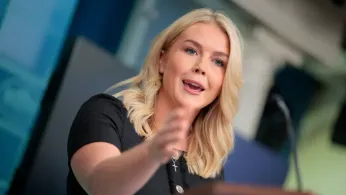
Aug 31
Karoline Leavitt’s Remarks on “Pregnant People” Ignite Debate Amid CDC Leadership Shakeup
READ TIME: 3 MIN.
The Centers for Disease Control and Prevention (CDC) has been thrust into controversy following the resignation of Dr. Demetre Daskalakis, Director of the National Center for Immunization and Respiratory Diseases. In a public letter posted on X (formerly Twitter), Daskalakis cited an inability to serve effectively under the current administration’s direction, referencing perspectives promoted by Health Secretary Robert F. Kennedy Jr. that he found incompatible with his role and personal values. Daskalakis expressed pride in his work at the CDC but concluded, “Enough is enough,” signaling deep frustration with the agency’s shifting priorities and the broader political environment influencing public health policy .
Addressing the resignation, White House Press Secretary Karoline Leavitt openly criticized Daskalakis for using the term “pregnant people” in public health communications, suggesting this language was grounds for his departure. Leavitt stated, “He identifies pregnant women as ‘pregnant people,’ so that’s not someone who we want in this administration,” and emphasized that those not aligned with President Trump or Secretary Kennedy’s vision would be “gladly shown the door” . Her remarks came amid heightened scrutiny of the CDC’s leadership and prompted a wave of responses from public health experts, LGBTQ+ organizations, and concerned citizens.
The term “pregnant people” is widely recognized in medical and advocacy communities for its inclusivity, acknowledging that transgender men, nonbinary individuals, and people of other gender identities may also experience pregnancy. The Centers for Disease Control and Prevention has adopted this language in many of its official materials, reflecting evolving standards in public health communication aimed at reducing stigma and promoting equitable care .
LGBTQ+ advocacy groups and medical professionals quickly condemned Leavitt’s comments. The Human Rights Campaign released a statement affirming that “inclusive language in healthcare is essential to ensuring everyone receives equitable treatment and respect,” adding that attacks on such terminology reflect broader attempts to marginalize transgender and nonbinary people in public policy . The National Center for Transgender Equality also weighed in, noting that “language matters—especially when it comes to access to life-saving health information and services” .
Social media platforms saw an immediate surge in posts addressing both the resignation and Leavitt’s remarks. On X and Instagram, hashtags such as #PregnantPeople and #InclusiveHealthcare trended for several hours as users voiced support for the use of gender-neutral language in medical settings and called on the federal government to prioritize inclusivity in all aspects of public health .
Prominent medical organizations, including the American Medical Association, have long advocated for the recognition of diverse gender identities in healthcare. Their position is that inclusive terminology is not only respectful but clinically necessary to ensure that all patients feel seen and heard—especially those in marginalized communities who have historically faced barriers to care .
Leavitt’s statements reflect ongoing political battles over the role of science, equity, and diversity in government agencies. The CDC, under pressure from the White House and Health Secretary Kennedy, is undergoing significant restructuring, with an emphasis on “restoring trust, transparency, and credibility,” according to Leavitt . Critics argue that these moves risk alienating key experts and undermining the CDC’s ability to address public health crises with evidence-based approaches. The departure of leaders like Daskalakis, who was known for his work on HIV/AIDS and LGBTQ+ health equity, raises concerns about the future direction of the agency.
For LGBTQ+ communities, the episode underscores the ongoing challenges of achieving true inclusivity in public health and government institutions. Advocates stress that visibility and recognition through language are critical steps toward health equity. The controversy serves as a reminder of the importance of defending inclusive practices in both policy and communication.
The intersection of political rhetoric, leadership changes, and inclusive language at the CDC has sparked national debate. Karoline Leavitt’s comments on “pregnant people” have galvanized LGBTQ+ advocates, medical professionals, and allies, prompting calls for the federal government to reaffirm its commitment to equity and evidence-based public health. As the CDC continues to navigate internal changes and public scrutiny, the outcome will have lasting implications for how health information is communicated and who feels represented in the nation’s most prominent health agency.






